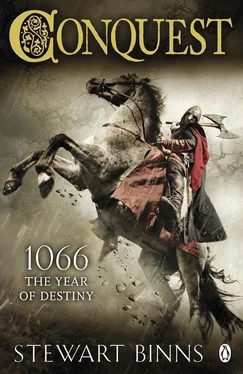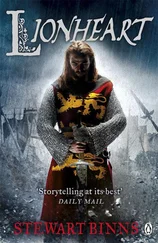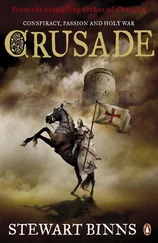Everyone agreed that, under the circumstances, it was a clever plan, typical of Hereward’s burgeoning leadership.
‘Edwin, you must make another trip to King Svein’s court in Denmark. Take some of Martin’s messengers with you, so that I know every move the Danes make. They must do two things. Firstly, their fleet must appear in the South, near the Thames Estuary, or in Kent. It must look like they are trying to find a place to launch an invasion, and they must send out raiding parties to harass the local Normans. That will persuade William to despatch men eastwards and southwards, and fewer men will be available for his northern expedition. The second task for the Danes is to destroy the Norman fleet. In every port from the Isle of Wight to Shoeburyness, they must burn and sink all Norman vessels they find. This will cut the Normans off from their homeland, which is vital if we’re to have any success in moving on the South.’
Everyone looked at Hereward in admiration. He had formulated an audacious new strategy that, if all went well and everyone played their part, could have William on the run and unable to escape to Normandy.
If the English then rose en masse, William would be finished.
Einar spoke for all of them. ‘It is daring and it is cunning. Congratulations, Hereward.’
‘Thank you, Einar. Call the men together. Alphonso, the training becomes your responsibility. We start tomorrow; make us suffer, make us think and make us ruthless.’
The days passed quickly. Alphonso was a master of intelligent regimes; he organized weapons competitions, assault courses, tests of navigation and horsemanship. He believed that irregular warfare should be undertaken by small groups of equals and insisted that all join in, regardless of status. When in training, there were no ranks and everyone spoke to one another by first name.
The routine of training was interrupted only once, at the end of June, when a messenger appeared with sad news for everyone close to England’s cause.
Edith Swan-Neck had been given permission by William to return to her family home at Nazeing in Essex. She went under heavy guard and called at Waltham Abbey to pray. But by the time she reached Nazeing, she was ill with a fever. Only two days later, she was dead. Her family was convinced she had been poisoned on orders from the Duke. Fearing that the Normans might realize Harold was interred there, the family chose not to bury her next to him at Waltham, but in the family plot at Nazeing Church.
Training resumed early the next morning, as usual. Hereward had ridden off with Einar well before dawn to survey from Pen Hill the vast forested landscape of the western Pennines. Over 1,800 feet above sea level, there was a remarkable view from its summit. The great expanse of Bowland Forest lay to the north and beyond that was Lancaster, the last major English bastion before the northern wilderness and the lawless Scottish borders. To the west, the land fell away to the Irish Sea, just visible in the distance. To the south and east, rising above the forests, stretched the endless rolling moorland of the Pennines. Local folklore claimed that, when York was burned to the ground during the Viking invasions many years earlier, the glow could be seen from Pen Hill.
Just after midday, Ingigerd and Maria appeared, clambering up the steep track towards the summit. They had decided to bring food for the men. But, more than that, they had been concerned about Hereward. It was Midsummer’s Eve, a special day in the old religion and, aware that news of Edith’s death had arrived at such a symbolic time, they wondered how much it had disturbed him. Often, they had discussed whether he secretly yearned for a consort with whom to share the burden of leadership. Could Edith have fulfilled that role? They would have made an extraordinary couple as England’s Regent and Consort, despite the opprobrium of those who might have resented their humble origins.
After they had eaten, Einar, guessing what the women were up to, took the sentries off to patrol around the summit.
Ingigerd spoke first. ‘Hereward, why don’t you take a woman?’
He smiled at them both. As a soldier, he admired their strategy – a full-frontal assault, no initial skirmishes, no feints.
‘Do you think I’m in need of one?’
Maria’s tone was softer but her approach was just as direct. ‘It is a long time since Torfida died, and you carry such a huge burden for all of us and for England. Wouldn’t it be a comfort to have someone to confide in and open your heart to?’
Before Hereward could respond, Ingigerd resumed. ‘Aren’t you lonely?’
‘My dearest friends, you are very thoughtful and I appreciate your kindness. The truth is, there have been only two women in my life that I wanted to spend the rest of my days with – and both are dead. When I was no more than a boy, Gythin was my first love. Her death in terrible circumstances was the catalyst that began the extraordinary events that have shaped my life. Then there was Torfida, the amazing, beautiful Torfida we all loved. She was my one true love; no one could fill Torfida’s place in my heart.’
They both put their arms around him.
Maria had tears in her eyes. ‘But, Hereward, what of the future? When all this is over, what will become of you?’
‘I don’t know what will become of any of us. England is in a perilous state and we are facing almost insurmountable odds. We will need great good fortune to be successful.’
‘Will we ever see St Cirq Lapopie again?’
‘I sincerely hope so. My greatest wish is to make England secure, oversee Edgar’s ascendency to the throne and then retire to France to watch Gunnhild and Estrith grow into women and produce grandchildren for me to spoil.’
‘And will you live out those days with a beloved you can call your own?’
‘Who knows? First, let me deal with the small matter of England’s future.’
Ingigerd and Maria realized that Hereward was focused on one thing only. He was a man of remarkable conviction and strength. He had always had a warrior’s spirit but, since recovering from Torfida’s death, and following his journey to meet Rodrigo Diaz, he had also added profound wisdom to his many other qualities.
Hereward brought their discussion to a close. ‘Let’s find Einar and go back to camp to see the girls.’
The four of them began the steep descent to their waiting horses. As they did so, they caught sight of a small plume of smoke rising from the tiny hamlet of Downham, nestling in the shadow of Pen Hill.
‘Einar, in all the time we’ve been here, not a single local man has come to us and asked to join our cause. They must know of the peril that is only two days’ ride away in York?’
‘Yes, they know, but they pray it won’t come their way. York is another world for them; so is Lancaster. As for Winchester, it could be in the Holy Roman Empire for all they know. You can’t expect them to rush to our side when they don’t have the strength to wield a weapon properly. Don’t judge them too harshly; it’s not so very different throughout much of England. Remember all the earls, merchants and burghers who have already bowed to the Duke.’
‘That’s our problem. The Normans have ambition and a steely resolve, made stronger by the riches of conquest. Most of the English, be they Saxon, Dane, or Celt, already have the look of a beaten people and are resigned to their fate.’
‘Hereward, how do you keep going with such grave doubts?’
Before answering, Hereward reflected for a while, touching the Talisman as he did so. ‘My good friend, I have come to understand that all a man can do is follow his own path. Whatever his destiny, he will only find it by being brave in the choices he makes. Somehow, at the end of all this, there is an outcome that will be determined by circumstances playing themselves out like a gigantic game of chess. We are only four hundred men and there are perhaps no more than a few thousand we can rely on in the whole of England. But the game is not William’s yet; there will be weaknesses in the Norman position, and we have to find them. I don’t know how many Normans hold this land – perhaps fifteen or twenty thousand – but they rule only with the support of many Englishmen. That will change if William makes an error of judgement. Tactically, I’d say we’ve lost too many pieces, especially our pawns and knights. Now our Queen has gone, but our King still lives – Edgar, our rightful heir. Our defence is still solid in our wild northern stronghold. If we keep our nerve, William may yet make a mistake, and those who have submitted to him will think again. Our four thousand will quickly become forty thousand; then it will be a different endgame.’
Читать дальше












